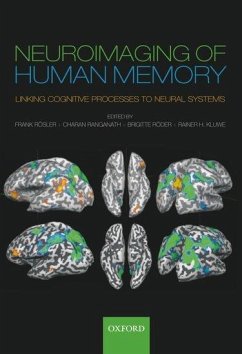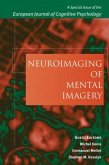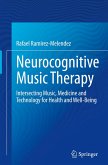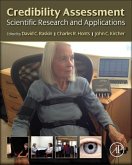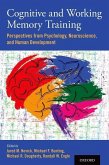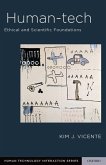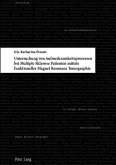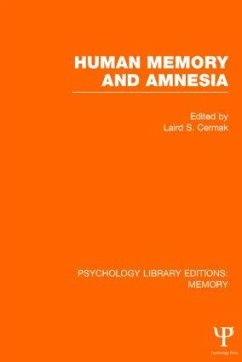Neuroimaging of Human Memory
Herausgeber: Rösler, Frank; Kluwe, Rainer; Röder, Brigitte; Ranganath, Charan
Neuroimaging of Human Memory
Herausgeber: Rösler, Frank; Kluwe, Rainer; Röder, Brigitte; Ranganath, Charan
- Gebundenes Buch
- Merkliste
- Auf die Merkliste
- Bewerten Bewerten
- Teilen
- Produkt teilen
- Produkterinnerung
- Produkterinnerung
This cutting-edge volume shows how brain imaging methods, such as fMRI and electroencephalography (EEG), can help us increase our knowledge of the organisation of human memory, how our memory representations are stored, consolidated and retrieved, and how access to memory contents is controlled.
Andere Kunden interessierten sich auch für
![Neuroimaging of Mental Imagery Neuroimaging of Mental Imagery]() Michel Denis / Emmanuel Mellet / Stephen M. Kosslyn (eds.)Neuroimaging of Mental Imagery191,99 €
Michel Denis / Emmanuel Mellet / Stephen M. Kosslyn (eds.)Neuroimaging of Mental Imagery191,99 €![Neurocognitive Music Therapy Neurocognitive Music Therapy]() Rafael Ramírez-MeléndezNeurocognitive Music Therapy108,99 €
Rafael Ramírez-MeléndezNeurocognitive Music Therapy108,99 €![Credibility Assessment Credibility Assessment]() Credibility Assessment104,99 €
Credibility Assessment104,99 €![Cognitive and Working Memory Training Cognitive and Working Memory Training]() Cognitive and Working Memory Training139,99 €
Cognitive and Working Memory Training139,99 €![Human-Tech Human-Tech]() Kim VicenteHuman-Tech136,99 €
Kim VicenteHuman-Tech136,99 €![Untersuchung von Aufmerksamkeitsprozessen bei Multiple Sklerose Patienten mittels funktioneller Magnet Resonanz Tomographie Untersuchung von Aufmerksamkeitsprozessen bei Multiple Sklerose Patienten mittels funktioneller Magnet Resonanz Tomographie]() Iris-Katharina PennerUntersuchung von Aufmerksamkeitsprozessen bei Multiple Sklerose Patienten mittels funktioneller Magnet Resonanz Tomographie94,35 €
Iris-Katharina PennerUntersuchung von Aufmerksamkeitsprozessen bei Multiple Sklerose Patienten mittels funktioneller Magnet Resonanz Tomographie94,35 €![Human Memory and Amnesia (PLE Human Memory and Amnesia (PLE]() Human Memory and Amnesia (PLE244,99 €
Human Memory and Amnesia (PLE244,99 €-
-
-
This cutting-edge volume shows how brain imaging methods, such as fMRI and electroencephalography (EEG), can help us increase our knowledge of the organisation of human memory, how our memory representations are stored, consolidated and retrieved, and how access to memory contents is controlled.
Hinweis: Dieser Artikel kann nur an eine deutsche Lieferadresse ausgeliefert werden.
Hinweis: Dieser Artikel kann nur an eine deutsche Lieferadresse ausgeliefert werden.
Produktdetails
- Produktdetails
- Verlag: Sydney University Press
- Seitenzahl: 488
- Erscheinungstermin: 3. Mai 2009
- Englisch
- Abmessung: 253mm x 181mm x 28mm
- Gewicht: 1125g
- ISBN-13: 9780199217298
- ISBN-10: 0199217297
- Artikelnr.: 25684683
- Verlag: Sydney University Press
- Seitenzahl: 488
- Erscheinungstermin: 3. Mai 2009
- Englisch
- Abmessung: 253mm x 181mm x 28mm
- Gewicht: 1125g
- ISBN-13: 9780199217298
- ISBN-10: 0199217297
- Artikelnr.: 25684683
Frank Rösler received his Dr. phil in 1976 and the grade of a Dr. phil. habil. in 1982 both from Christian-Albrechts-University Kiel (Germany). He held academic positions at the Christian-Albrechts-University Kiel (1973-1986); the University of Hamburg (1983, 1985) and at Philipps-University Marburg (from1986 until the present). He spent short and long-term research visits in the US, in Australia and in the Netherlands. His research was awarded with the university prize of Christian-Albrechts University Kiel (1977), the Wilhelm-Wundt Medal of the German Psychological Society (DGPs, 2000) and the Max-Planck-Prize for international cooperation (2002). Frank Rösler is full member of Berlin-Brandenburg Academy of Sciences (BBAW) and of the German Academy of Sciences Leopoldina. His research interests focus on experimental psychology and cognitive neuroscience, in particular on studies of memory, executive functions, language, and neuronal plasticity employing EEG-ERP and fMRI measures. Brigitte Röder received her Dr. rer nat (equiv. to a Ph.D.) in 1996 from the Philipps-University of Marburg (Germany). As a postdoc she visited the Department of Psychology and Neuroscience (H.J. Neville), University of Oregon, Eugene (U.S.) from 1995 to 1997. Brigitte Röderwas the head of a junior research group from 1999 to 2003. Since 2003 Brigitte Röder has been a full professor for Biological Psychology and Neuropsychology at the University of Hamburg. For her scientific achievements she received awards of the German Society of Psychology, the Academy of Sciences (Goettingen) and European Society for Psychophysiology. Since 2007 Brigitte Röder has been a full member of the Academy of Science in Hamburg. Her main research interests are multisensory processing and neuroplasticity as a consequence of learning and sensory deprivation. Methods include behavioral and electrophysiological measures as well as functional magnetic resonance imaging (fMRI). Rainer H. Kluwe studied Psychology at the Universities of Erlangen and Trier; 1971 Diploma in Psychology; 1975 Dr. phil. University of Trier; 1981 Dr. phil. habil. Ludwig-Maximilian-University of Munich; Academic positions from 1972 until 1980 at the University of Kiel and the Ludwig-Maximilian University of Munich; since 1981 Professor of Psychology at the Helmut Schmidt University Hamburg; 1987 head of the Institute for Cognitive Research. 1978 - 1979 Research fellow Department of Psychology, Stanford University, CA., USA, funded by Foundation VW; Oct-Dec 1989 Visiting Professor Department of Experimental Psychology; Oxford University, UK and Visiting Fellow Wolfson College. Research interests: metacognition, working memory; 2002-2008 Priority program on executive control together with B. Hommel (Leiden) and I. Daum (Bochum) funded by the German Research Society.
* 1: Frank Rösler, Charan Ranganath, Brigitte Röder and Rainer H Kluwe:
Introduction
* Part I - Setting the Stage
* 2: Frank Rösler and Charan Ranganath: On how to reconcile mind and
brain
* 3: Rolf Ulrich: Uncovering unobservable cognitive mechanisms: the
contribution of methematical models
* Part II - Learning and Consolidation
* 4: John O'Doherty: Reinforcement learning mechanisms in the human
brain: insights from model-based MRI
* 5: Christian Büchel: Cognitive models in learning and reward
processing
* 6: Dara G Ghahremani and Russell A Poldrack: Neuroimaging and
interactive memory systems
* 7: Paul Reber: contributions of functional neuroimaging to theories
of category learning
* 8: Guillén Fernández and Indira Tendolkar: Declarative memory
consolidation
* 9: Alan Richardson-Klavehn, Elena Magno, Gerasimos Markopoulos,
Catherine M Sweeney-Reed and Maria Wimber: Integrative commentary: on
the intimate relationship between neurobiology and function in the
theoretical analysis of human learning and memory
* Part III - Working Memory Control Processes and Storage
* 10: Matthew R Johnson and Marcia K Johnson: Toward characterizing the
neural correlates of component processes of cognition
* 11: Adrian M Owen and Adam Hampshire: The mid-ventrolateral frontal
cortex and attentional control
* 12: Bradley R Postle: mechanisms underlying the short-term retention
of information
* 13: Charan Ranganath: Interrelationships between working memory and
long-term memory
* 14: Bradley Buchsbaum and Mark D'Esposito: Integrative commentary: Is
there anything special about working memory?
* Part IV - Long-Term Memory Representations
* 15: Alumit Ishai: Retrieving pircutres from long-term memory
* 16: Patrick Khader and Frank Rösler: Where memories are stored
disclosed how memories are formed: content specificity of long-term
memory representations
* 17: Ken R Norman, Joel R Quamme and Ehren L Newman: Mulitvariate
methods for tracking representations in the brain
* 18: Kevin LaBar: Emotional influences on episodic memory
* 19: Andrew Yonelinas: Integrative commentary: Developing theories
that bridge brain and behavior - some thoughts of a cognitive
psychologist
* Part V - Control Processes During Encoding and Retrieval
* 20: Axel Mecklinger and Theodor Jäger: Episodic memory storage and
retrieval: insights from electrophysiological measures
* 21: Ken A Paller, Joel L Voss and Carmen E Westerberg: Memory and
awareness of remembering
* 22: Jon S Simons: Constraints from cognitive theories on neuroimaging
studies of source memory
* 23: Enrah Düzel and Sebastian Guderian: Oscillatory and hemodynamic
medial temporal responses preceding stimulus onset modulate episodic
memory
* 24: Michael D Rugg: Integrative commentary: Functional neuroimaging
and cognitive theory
Introduction
* Part I - Setting the Stage
* 2: Frank Rösler and Charan Ranganath: On how to reconcile mind and
brain
* 3: Rolf Ulrich: Uncovering unobservable cognitive mechanisms: the
contribution of methematical models
* Part II - Learning and Consolidation
* 4: John O'Doherty: Reinforcement learning mechanisms in the human
brain: insights from model-based MRI
* 5: Christian Büchel: Cognitive models in learning and reward
processing
* 6: Dara G Ghahremani and Russell A Poldrack: Neuroimaging and
interactive memory systems
* 7: Paul Reber: contributions of functional neuroimaging to theories
of category learning
* 8: Guillén Fernández and Indira Tendolkar: Declarative memory
consolidation
* 9: Alan Richardson-Klavehn, Elena Magno, Gerasimos Markopoulos,
Catherine M Sweeney-Reed and Maria Wimber: Integrative commentary: on
the intimate relationship between neurobiology and function in the
theoretical analysis of human learning and memory
* Part III - Working Memory Control Processes and Storage
* 10: Matthew R Johnson and Marcia K Johnson: Toward characterizing the
neural correlates of component processes of cognition
* 11: Adrian M Owen and Adam Hampshire: The mid-ventrolateral frontal
cortex and attentional control
* 12: Bradley R Postle: mechanisms underlying the short-term retention
of information
* 13: Charan Ranganath: Interrelationships between working memory and
long-term memory
* 14: Bradley Buchsbaum and Mark D'Esposito: Integrative commentary: Is
there anything special about working memory?
* Part IV - Long-Term Memory Representations
* 15: Alumit Ishai: Retrieving pircutres from long-term memory
* 16: Patrick Khader and Frank Rösler: Where memories are stored
disclosed how memories are formed: content specificity of long-term
memory representations
* 17: Ken R Norman, Joel R Quamme and Ehren L Newman: Mulitvariate
methods for tracking representations in the brain
* 18: Kevin LaBar: Emotional influences on episodic memory
* 19: Andrew Yonelinas: Integrative commentary: Developing theories
that bridge brain and behavior - some thoughts of a cognitive
psychologist
* Part V - Control Processes During Encoding and Retrieval
* 20: Axel Mecklinger and Theodor Jäger: Episodic memory storage and
retrieval: insights from electrophysiological measures
* 21: Ken A Paller, Joel L Voss and Carmen E Westerberg: Memory and
awareness of remembering
* 22: Jon S Simons: Constraints from cognitive theories on neuroimaging
studies of source memory
* 23: Enrah Düzel and Sebastian Guderian: Oscillatory and hemodynamic
medial temporal responses preceding stimulus onset modulate episodic
memory
* 24: Michael D Rugg: Integrative commentary: Functional neuroimaging
and cognitive theory
* 1: Frank Rösler, Charan Ranganath, Brigitte Röder and Rainer H Kluwe:
Introduction
* Part I - Setting the Stage
* 2: Frank Rösler and Charan Ranganath: On how to reconcile mind and
brain
* 3: Rolf Ulrich: Uncovering unobservable cognitive mechanisms: the
contribution of methematical models
* Part II - Learning and Consolidation
* 4: John O'Doherty: Reinforcement learning mechanisms in the human
brain: insights from model-based MRI
* 5: Christian Büchel: Cognitive models in learning and reward
processing
* 6: Dara G Ghahremani and Russell A Poldrack: Neuroimaging and
interactive memory systems
* 7: Paul Reber: contributions of functional neuroimaging to theories
of category learning
* 8: Guillén Fernández and Indira Tendolkar: Declarative memory
consolidation
* 9: Alan Richardson-Klavehn, Elena Magno, Gerasimos Markopoulos,
Catherine M Sweeney-Reed and Maria Wimber: Integrative commentary: on
the intimate relationship between neurobiology and function in the
theoretical analysis of human learning and memory
* Part III - Working Memory Control Processes and Storage
* 10: Matthew R Johnson and Marcia K Johnson: Toward characterizing the
neural correlates of component processes of cognition
* 11: Adrian M Owen and Adam Hampshire: The mid-ventrolateral frontal
cortex and attentional control
* 12: Bradley R Postle: mechanisms underlying the short-term retention
of information
* 13: Charan Ranganath: Interrelationships between working memory and
long-term memory
* 14: Bradley Buchsbaum and Mark D'Esposito: Integrative commentary: Is
there anything special about working memory?
* Part IV - Long-Term Memory Representations
* 15: Alumit Ishai: Retrieving pircutres from long-term memory
* 16: Patrick Khader and Frank Rösler: Where memories are stored
disclosed how memories are formed: content specificity of long-term
memory representations
* 17: Ken R Norman, Joel R Quamme and Ehren L Newman: Mulitvariate
methods for tracking representations in the brain
* 18: Kevin LaBar: Emotional influences on episodic memory
* 19: Andrew Yonelinas: Integrative commentary: Developing theories
that bridge brain and behavior - some thoughts of a cognitive
psychologist
* Part V - Control Processes During Encoding and Retrieval
* 20: Axel Mecklinger and Theodor Jäger: Episodic memory storage and
retrieval: insights from electrophysiological measures
* 21: Ken A Paller, Joel L Voss and Carmen E Westerberg: Memory and
awareness of remembering
* 22: Jon S Simons: Constraints from cognitive theories on neuroimaging
studies of source memory
* 23: Enrah Düzel and Sebastian Guderian: Oscillatory and hemodynamic
medial temporal responses preceding stimulus onset modulate episodic
memory
* 24: Michael D Rugg: Integrative commentary: Functional neuroimaging
and cognitive theory
Introduction
* Part I - Setting the Stage
* 2: Frank Rösler and Charan Ranganath: On how to reconcile mind and
brain
* 3: Rolf Ulrich: Uncovering unobservable cognitive mechanisms: the
contribution of methematical models
* Part II - Learning and Consolidation
* 4: John O'Doherty: Reinforcement learning mechanisms in the human
brain: insights from model-based MRI
* 5: Christian Büchel: Cognitive models in learning and reward
processing
* 6: Dara G Ghahremani and Russell A Poldrack: Neuroimaging and
interactive memory systems
* 7: Paul Reber: contributions of functional neuroimaging to theories
of category learning
* 8: Guillén Fernández and Indira Tendolkar: Declarative memory
consolidation
* 9: Alan Richardson-Klavehn, Elena Magno, Gerasimos Markopoulos,
Catherine M Sweeney-Reed and Maria Wimber: Integrative commentary: on
the intimate relationship between neurobiology and function in the
theoretical analysis of human learning and memory
* Part III - Working Memory Control Processes and Storage
* 10: Matthew R Johnson and Marcia K Johnson: Toward characterizing the
neural correlates of component processes of cognition
* 11: Adrian M Owen and Adam Hampshire: The mid-ventrolateral frontal
cortex and attentional control
* 12: Bradley R Postle: mechanisms underlying the short-term retention
of information
* 13: Charan Ranganath: Interrelationships between working memory and
long-term memory
* 14: Bradley Buchsbaum and Mark D'Esposito: Integrative commentary: Is
there anything special about working memory?
* Part IV - Long-Term Memory Representations
* 15: Alumit Ishai: Retrieving pircutres from long-term memory
* 16: Patrick Khader and Frank Rösler: Where memories are stored
disclosed how memories are formed: content specificity of long-term
memory representations
* 17: Ken R Norman, Joel R Quamme and Ehren L Newman: Mulitvariate
methods for tracking representations in the brain
* 18: Kevin LaBar: Emotional influences on episodic memory
* 19: Andrew Yonelinas: Integrative commentary: Developing theories
that bridge brain and behavior - some thoughts of a cognitive
psychologist
* Part V - Control Processes During Encoding and Retrieval
* 20: Axel Mecklinger and Theodor Jäger: Episodic memory storage and
retrieval: insights from electrophysiological measures
* 21: Ken A Paller, Joel L Voss and Carmen E Westerberg: Memory and
awareness of remembering
* 22: Jon S Simons: Constraints from cognitive theories on neuroimaging
studies of source memory
* 23: Enrah Düzel and Sebastian Guderian: Oscillatory and hemodynamic
medial temporal responses preceding stimulus onset modulate episodic
memory
* 24: Michael D Rugg: Integrative commentary: Functional neuroimaging
and cognitive theory
